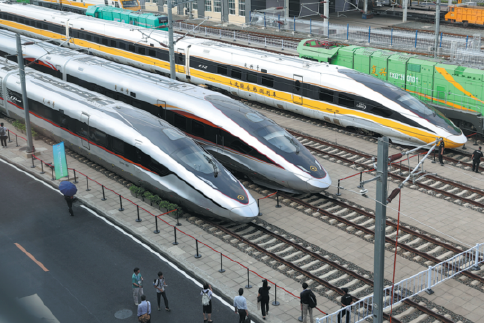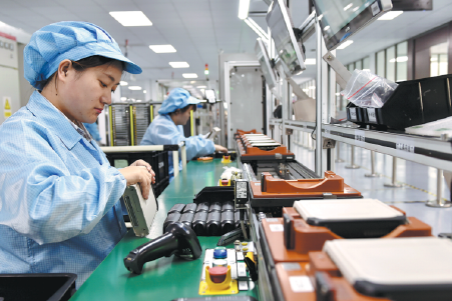Low-calorie, filling foods sell like hot cakes


Meal replacement products, or substitutes for regular meals that can fill you up with low-calorie intakes, are emerging as a potential big market in China, driven by Chinese consumers' demand for products that can help in weight control, offer convenience and result in consumption upgrade, experts said.
The most common meal replacement products include powders, liquids, shakes, porridges and energy bars containing fiber, protein, vitamin, minerals and other nutritious content.
He Lixin, 23, a public relations practitioner in Beijing, drinks a bottle of a meal replacement shake at dinner about once or twice a week, when she does not want to cook a meal for herself.
After pouring into water, the powder in the bottle becomes something similar to sticky smashed porridge, she said. "Most of them don't taste good, but at least they have low calories and are convenient to buy, store and cook," she said, adding the product she consumes gives a strong sense of fullness.
She buys the bottles online. Six of them cost her about 100 yuan ($14.7).
Most of consumers of meal replacement products were women, with an average expense of up to 3,000 yuan per person per year, data from Tmall, an online marketplace of Alibaba Group, showed.
Euromonitor International, a market research company, said market size or sales revenue of meal replacement products in China hit 57.17 billion yuan in 2017 and is expected to reach 120 billion yuan by 2022.
Fu Yazhang, investment manager of Meridian Capital China, an investment firm, said many companies involved in the sector reaped good profits in recent years.
"It's been a surge this year. It can be explained by the pandemic when more people felt they became fatter staying at home, and began to care more about health," he said, adding average annual growth of the meal replacement market was 16 percent during 2017-20, with the consumer group enlarging and prices rising.
Cao Peng, founder of Smeal (Shanghai) Biotechnology Co Ltd, a 2-year-old startup, said its monthly sales surged four to five times from January to August year-on-year, as people preferred convenience foods when shopping and dining out were restricted during the COVID-19 pandemic peak period.
Its bottled powder can be easily cooked-consumers just need to add some cold water, shake and drink. He said the texture is like that of a fluid. Flavors range from chocolate and coffee to milk tea and black sesame, to enhance consumer experience. Each bottle of 75 grams retails for 18 yuan, and packs in 270 calories, around 80 calories lower than regular meals, he said.
"Chinese consumers are increasingly anxious about health, and sometimes feel guilty about eating snacks or high-calorie foods," he said. "But they also have a requirement for taste and flavor. So it's important to balance calorie-intake control and mouthfeel."
In the past, Smeal used to e-sell only on JD and Tmall. Recently, it kicked off its offline sales at outlets of beauty products retailer Watsons.
About 80 percent of consumers of Smeal are women from first-and second-tier cities. The company finished its third round of financing in July, but it is yet to break even.
Besides Smeal, startups Ffit8 and WonderLab also received financing in July.
Social commerce platform Xiaohongshu has about 200,000 posts about meal replacement products. Advertisements also sprung up on live streams, short videos and WeChat Moments.
More fast-moving consumer goods giants are partaking in the market action. PepsiCo's oat brand Quaker released a new shake product in June. Major Chinese snack brand Bestore released 27 meal replacement products in August, targeting consumers aged 18 to 35.
Vitamin and dietary supplements company Byhealth put forward its new nutritious brand targeting young mothers, whose products include protein and fiber-infused shake and "solid beverage".
Jiang Xinwei, analyst of consultancy Analysys, said the market is at the early stage of competition and there is big room for future development, like in the United States and Japan.
George Ren, senior partner and vice-president of consultancy Roland Berger China, said as the country is building a moderately prosperous society by this year-end, Chinese people's rationale for food consumption has evolved from survival, energy and taste to well-being.
But demand for and supply of healthy and nutritious food are not balanced, he said.
He suggested pricing should be sensible, not too high, to increase acceptance of the public. Companies should offer sufficient and precise product information to consumers.
As more meal replacement products spring up, problems and challenges thereof are also receiving attention. For instance, marketing promotions could tend to make false promises or tall claims, in a bid to take advantage of the lack of standards and regulations for this niche.
Pan Danfeng, director of nutrition department of Guangzhou First People's Hospital, told Guangzhou Daily that consumers should learn more about enterprise qualification and nutritional ingredients, and follow the advice of professional dietitians. "Eating meal replacement products blindly may lead to malnutrition and create health risks."
Gu Zhongyi, a nutritionist at the Beijing Dietetic Association, told Beijing Daily that people should not consume such products more than once a day.




































